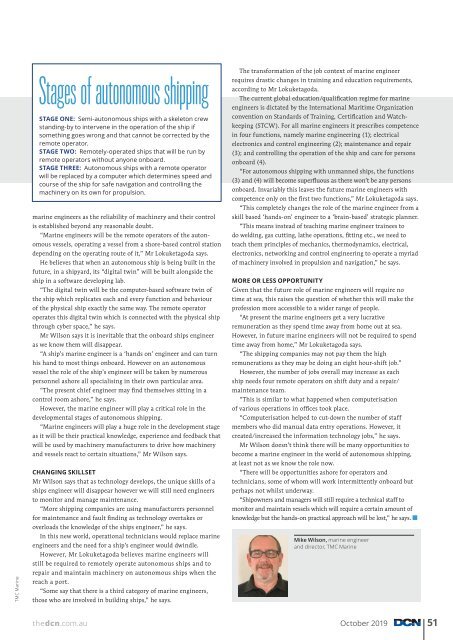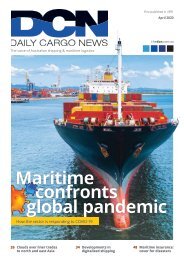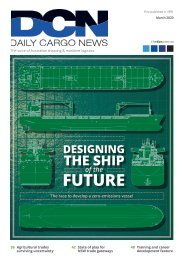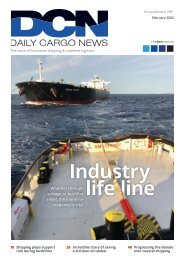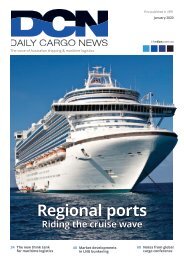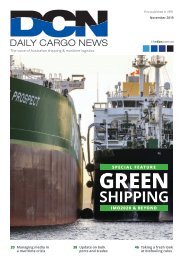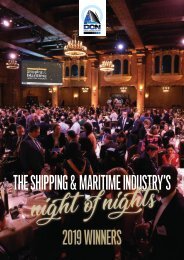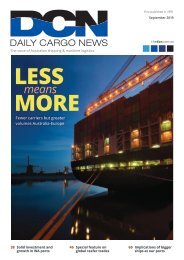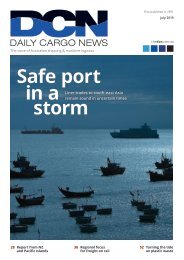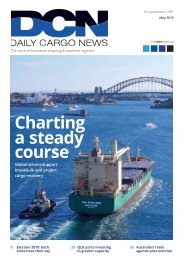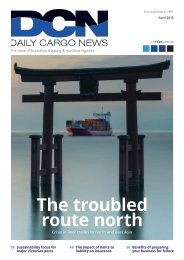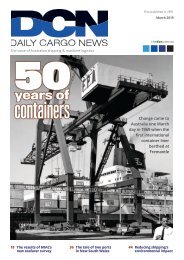DCN October Edition 2019
You also want an ePaper? Increase the reach of your titles
YUMPU automatically turns print PDFs into web optimized ePapers that Google loves.
TMC Marine<br />
Stages of autonomous shipping<br />
STAGE ONE: Semi-autonomous ships with a skeleton crew<br />
standing-by to intervene in the operation of the ship if<br />
something goes wrong and that cannot be corrected by the<br />
remote operator.<br />
STAGE TWO: Remotely-operated ships that will be run by<br />
remote operators without anyone onboard.<br />
STAGE THREE: Autonomous ships with a remote operator<br />
will be replaced by a computer which determines speed and<br />
course of the ship for safe navigation and controlling the<br />
machinery on its own for propulsion.<br />
marine engineers as the reliability of machinery and their control<br />
is established beyond any reasonable doubt.<br />
“Marine engineers will be the remote operators of the autonomous<br />
vessels, operating a vessel from a shore-based control station<br />
depending on the operating route of it,” Mr Lokuketagoda says.<br />
He believes that when an autonomous ship is being built in the<br />
future, in a shipyard, its “digital twin” will be built alongside the<br />
ship in a software developing lab.<br />
“The digital twin will be the computer-based software twin of<br />
the ship which replicates each and every function and behaviour<br />
of the physical ship exactly the same way. The remote operator<br />
operates this digital twin which is connected with the physical ship<br />
through cyber space,” he says.<br />
Mr Wilson says it is inevitable that the onboard ships engineer<br />
as we know them will disappear.<br />
“A ship’s marine engineer is a ‘hands on’ engineer and can turn<br />
his hand to most things onboard. However on an autonomous<br />
vessel the role of the ship’s engineer will be taken by numerous<br />
personnel ashore all specialising in their own particular area.<br />
“The present chief engineer may find themselves sitting in a<br />
control room ashore,” he says.<br />
However, the marine engineer will play a critical role in the<br />
developmental stages of autonomous shipping.<br />
“Marine engineers will play a huge role in the development stage<br />
as it will be their practical knowledge, experience and feedback that<br />
will be used by machinery manufacturers to drive how machinery<br />
and vessels react to certain situations,” Mr Wilson says.<br />
CHANGING SKILLSET<br />
Mr Wilson says that as technology develops, the unique skills of a<br />
ships engineer will disappear however we will still need engineers<br />
to monitor and manage maintenance.<br />
“More shipping companies are using manufacturers personnel<br />
for maintenance and fault finding as technology overtakes or<br />
overloads the knowledge of the ships engineer,” he says.<br />
In this new world, operational technicians would replace marine<br />
engineers and the need for a ship’s engineer would dwindle.<br />
However, Mr Lokuketagoda believes marine engineers will<br />
still be required to remotely operate autonomous ships and to<br />
repair and maintain machinery on autonomous ships when the<br />
reach a port.<br />
“Some say that there is a third category of marine engineers,<br />
those who are involved in building ships,” he says.<br />
The transformation of the job context of marine engineer<br />
requires drastic changes in training and education requirements,<br />
according to Mr Lokuketagoda.<br />
The current global education/qualification regime for marine<br />
engineers is dictated by the International Maritime Organization<br />
convention on Standards of Training, Certification and Watchkeeping<br />
(STCW). For all marine engineers it prescribes competence<br />
in four functions, namely marine engineering (1); electrical<br />
electronics and control engineering (2); maintenance and repair<br />
(3); and controlling the operation of the ship and care for persons<br />
onboard (4).<br />
“For autonomous shipping with unmanned ships, the functions<br />
(3) and (4) will become superfluous as there won’t be any persons<br />
onboard. Invariably this leaves the future marine engineers with<br />
competence only on the first two functions,” Mr Lokuketagoda says.<br />
“This completely changes the role of the marine engineer from a<br />
skill based ‘hands-on’ engineer to a ‘brain-based’ strategic planner.<br />
“This means instead of teaching marine engineer trainees to<br />
do welding, gas cutting, lathe operations, fitting etc., we need to<br />
teach them principles of mechanics, thermodynamics, electrical,<br />
electronics, networking and control engineering to operate a myriad<br />
of machinery involved in propulsion and navigation,” he says.<br />
MORE OR LESS OPPORTUNITY<br />
Given that the future role of marine engineers will require no<br />
time at sea, this raises the question of whether this will make the<br />
profession more accessible to a wider range of people.<br />
“At present the marine engineers get a very lucrative<br />
remuneration as they spend time away from home out at sea.<br />
However, in future marine engineers will not be required to spend<br />
time away from home,” Mr Lokuketagoda says.<br />
“The shipping companies may not pay them the high<br />
remunerations as they may be doing an eight hour-shift job.”<br />
However, the number of jobs overall may increase as each<br />
ship needs four remote operators on shift duty and a repair/<br />
maintenance team.<br />
“This is similar to what happened when computerisation<br />
of various operations in offices took place.<br />
“Computerisation helped to cut-down the number of staff<br />
members who did manual data entry operations. However, it<br />
created/increased the information technology jobs,” he says.<br />
Mr Wilson doesn’t think there will be many opportunities to<br />
become a marine engineer in the world of autonomous shipping,<br />
at least not as we know the role now.<br />
“There will be opportunities ashore for operators and<br />
technicians, some of whom will work intermittently onboard but<br />
perhaps not whilst underway.<br />
“Shipowners and managers will still require a technical staff to<br />
monitor and maintain vessels which will require a certain amount of<br />
knowledge but the hands-on practical approach will be lost,” he says.<br />
Mike Wilson, marine engineer<br />
and director, TMC Marine<br />
thedcn.com.au <strong>October</strong> <strong>2019</strong> 51


